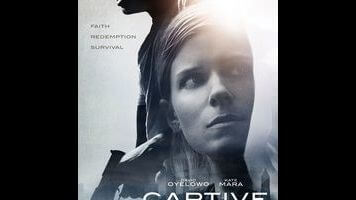There’s no doubt that the inspirational thriller Captive is based on a true story, because, as they say, you can’t make this stuff up. As Ashley Smith (Kate Mara) recounts the lows of her crystal-meth addiction at Narcotics Anonymous (it cost her custody of her young daughter), Brian Nichols (David Oyelowo), on trial for rape, breaks out of courthouse custody, killing a judge, a court reporter, and two law-enforcement officers in the process. He’s furious at a system that he feels won’t hear his side, but he’s also desperate to meet the baby son he’s just learned he has. Both Ashley and Brian, then, want to reap the joys of responsible parenting, though their demons obviously have other ideas. But after Brian forcibly enters Ashley’s apartment, the two strangers get the rare opportunity to scare each other straight—on their own terms. Brian snorts a couple lines of his hostage’s ice, they read passages from Rick Warren’s mega-bestseller The Purpose Driven Life, and the single mother, ever resourceful, softens the killer up by cooking him a stack of pancakes.
A couple familiar faces fill parallel outside-world plotlines here—The Wire’s Michael K. Williams appears as a detective on Brian’s tail, while Mimi Rogers plays Ashley’s aunt, her daughter’s guardian—but the Ashley-Brian back-and-forth naturally occupies most of the screen time. Mara’s character gets the fuller dramatic arc, and she smartly plays Ashley’s under-fire resourcefulness as something the addict has had to draw on before, but the movie owes most of what little electricity it has to Oyelowo. The actor’s tightly coiled movements speak volumes about his character, at once scared to death and surprisingly principled, and he makes you wish the script (by Brian Bird, adapting a memoir by the real-life Ashley Smith) attempted a more nuanced portrait of his troubled psychology, rather than mostly drafting him as a candidate for complementary redemption. Ashley initially tipped The Purpose Driven Life into the trash outside her support-group meeting, and when she begins thumbing through it later, Brian dismisses it as “a bunch of church crap.” But as dawn approaches, they eventually get on board with a vague notion of “purpose.” (At the point that the wisdom of Warren wins everyone’s approval, the movie seems eager to brush aside the fact that Brian, at least, is likely still high on crystal meth, given the compressed time frame of the action.)
Perhaps to cast the drama in starker relief, or else just because that’s the way it really happened, director Jerry Jameson and Bird (both network-TV vets) set this dark night of the soul in a suburban-Atlanta apartment that Ashley’s just started the process of moving into. Thus far, all the hard work seems to have gone into the bedroom that she intends for her daughter. This sacred space, painted and furnished, remains untouched during the duration of the movie, the bulk of whose action unfolds in front of the living room’s bare walls, cardboard boxes, and drawn blinds. The eventual result is that Jameson’s film, shot on timid handheld, takes on that apartment’s featureless aspect, not penetrating enough to make the overnight priority realignment hit home. The leads acquit themselves relatively well here, hinting at the interesting character study that could have been, but by the end the only captive left is the viewer.









































